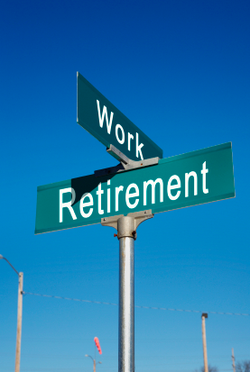
Seems baby boomers, you know... those born between 1946 and 1964 who have changed the world,... are not necessarily thinking about retirement at the traditional age of 65.
The last few years have been tough for the boomers. Stung by a recession, some now believe that they will continue to work according to a recent pole by NORC - Center for Public Affairs Research.
Some 82 percent of working Americans over 50 say it is at least somewhat likely they will work for pay in retirement.
The survey also found 47 percent of working survey respondents now expect to retire later than they previously thought and, on average, plan to call it quits at about 66, or nearly three years later than their estimate when they were 40.
About three-quarters of working respondents said they have given their retirement years some or a great deal of thought. When considering factors that are very or extremely important in their retirement decisions, 78 percent cited financial needs, 75 percent said health, 68 percent their ability to do their job and 67 percent said their need for employer benefits such as health insurance.
Increased lifespans and a renewed idea of when old age begins are also fueling more work among older adults. Six in 10 people said they feel younger than their age; only 6 percent said they feel older. Respondents said the average person is old at about 72. One in 5 said it depends on the person.
Even so, one-third of retired survey respondents said they did not stop working by choice. The figures were higher within certain demographic groups: racial minorities, those with less formal education or lower household incomes were more likely to feel they had no option but to retire. Eight percent say they were forced from a job because of their age. In interviews, survey respondents cited health as well as layoffs followed by unsuccessful job searches.
The last few years have been tough for the boomers. Stung by a recession, some now believe that they will continue to work according to a recent pole by NORC - Center for Public Affairs Research.
Some 82 percent of working Americans over 50 say it is at least somewhat likely they will work for pay in retirement.
The survey also found 47 percent of working survey respondents now expect to retire later than they previously thought and, on average, plan to call it quits at about 66, or nearly three years later than their estimate when they were 40.
About three-quarters of working respondents said they have given their retirement years some or a great deal of thought. When considering factors that are very or extremely important in their retirement decisions, 78 percent cited financial needs, 75 percent said health, 68 percent their ability to do their job and 67 percent said their need for employer benefits such as health insurance.
Increased lifespans and a renewed idea of when old age begins are also fueling more work among older adults. Six in 10 people said they feel younger than their age; only 6 percent said they feel older. Respondents said the average person is old at about 72. One in 5 said it depends on the person.
Even so, one-third of retired survey respondents said they did not stop working by choice. The figures were higher within certain demographic groups: racial minorities, those with less formal education or lower household incomes were more likely to feel they had no option but to retire. Eight percent say they were forced from a job because of their age. In interviews, survey respondents cited health as well as layoffs followed by unsuccessful job searches.

 RSS Feed
RSS Feed